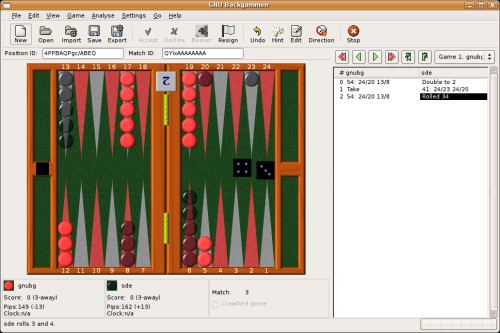GNU Backgammon (gnubg) is a strong backgammon program (world-class with a bearoff database installed) usable either as an engine by other programs or as a standalone backgammon game. It is able to play and analyze both money games and tournament matches, evaluate and roll out positions, and more.
In addition to supporting simple play, it also has extensive analysis features, a tutor mode, adjustable difficulty, and support for exporting annotated games.
It currently plays at about the level of a championship flight tournament player and is gradually improving.
gnubg can be played on numerous on-line backgammon servers, such as the First Internet Backgammon Server (FIBS).
Features include:
- A command line interface (with full command editing features if GNU readline is available) that lets you play matches and sessions against GNU Backgammon with a rough ASCII representation of the board on text terminals.
- Support for a GTK+ interface with a graphical board window. Both 2D and 3D graphics are available.
- Tournament match and money session cube handling and cubeful play.
- Support for both 1-sided and 2-sided bearoff databases: 1-sided bearoff database for 15 checkers on the first 6 points and optional 2-sided database kept in memory. Optional larger 1-sided and 2-sided databases stored on disk.
- Automated rollouts of positions, with lookahead and race variance reduction where appropriate. Rollouts may be extended.
- Functions to generate legal moves and evaluate positions at varying search depths.
- Neural net functions for giving cubeless evaluations of all other contact and race positions.
- Automatic and manual annotation (analysis and commentary) of games and matches.
- Record keeping of statistics of players in games and matches (both native inside GNU Backgammon and externally using relational databases and Python).
- Loading and saving analyzed games and matches as .sgf files (Smart Game Format).
- Exporting positions, games and matches to: (.eps) Encapsulated Postscript, (.gam) Jellyfish Game, (.html) HTML, (.mat) Jellyfish Match, (.pdf) PDF, (.png) Portable Network Graphics, (.pos) Jellyfish Position, (.ps) PostScript, (.sgf) Gnu Backgammon File, (.tex) LaTeX, (.txt) Plain Text, (.txt) Snowie Text.
- Import of matches and positions from a number of file
ormats: (.bkg) Hans Berliner’s BKG Format, (.gam) GammonEmpire Game, (.gam) PartyGammon Game, (.mat) Jellyfish Match, (.pos) Jellyfish Position, (.sgf) Gnu Backgammon File, (.sgg) GamesGrid Save Game, (.tmg) TrueMoneyGames, (.txt) Snowie Text. - Python Scripting.
- Native language support; 10 languages complete or in progress.
Website: www.gnu.org/software/gnubg
Support: Documentation
Developer: Joseph Heled, Oystein Johansen, Jonathan Kinsey, David Montgomery, Jim Segrave, Joern Thyssen, Gary Wong and contributors
License: GNU General Public License v2.0

| Popular series | |
|---|---|
| The largest compilation of the best free and open source software in the universe. Each article is supplied with a legendary ratings chart helping you to make informed decisions. | |
| Hundreds of in-depth reviews offering our unbiased and expert opinion on software. We offer helpful and impartial information. | |
| The Big List of Active Linux Distros is a large compilation of actively developed Linux distributions. | |
| Replace proprietary software with open source alternatives: Google, Microsoft, Apple, Adobe, IBM, Autodesk, Oracle, Atlassian, Corel, Cisco, Intuit, SAS, Progress, Salesforce, and Citrix | |
| Awesome Free Linux Games Tools showcases a series of tools that making gaming on Linux a more pleasurable experience. This is a new series. | |
| Machine Learning explores practical applications of machine learning and deep learning from a Linux perspective. We've written reviews of more than 40 self-hosted apps. All are free and open source. | |
| New to Linux? Read our Linux for Starters series. We start right at the basics and teach you everything you need to know to get started with Linux. | |
| Alternatives to popular CLI tools showcases essential tools that are modern replacements for core Linux utilities. | |
| Essential Linux system tools focuses on small, indispensable utilities, useful for system administrators as well as regular users. | |
| Linux utilities to maximise your productivity. Small, indispensable tools, useful for anyone running a Linux machine. | |
| Surveys popular streaming services from a Linux perspective: Amazon Music Unlimited, Myuzi, Spotify, Deezer, Tidal. | |
| Saving Money with Linux looks at how you can reduce your energy bills running Linux. | |
| Home computers became commonplace in the 1980s. Emulate home computers including the Commodore 64, Amiga, Atari ST, ZX81, Amstrad CPC, and ZX Spectrum. | |
| Now and Then examines how promising open source software fared over the years. It can be a bumpy ride. | |
| Linux at Home looks at a range of home activities where Linux can play its part, making the most of our time at home, keeping active and engaged. | |
| Linux Candy reveals the lighter side of Linux. Have some fun and escape from the daily drudgery. | |
| Getting Started with Docker helps you master Docker, a set of platform as a service products that delivers software in packages called containers. | |
| Best Free Android Apps. We showcase free Android apps that are definitely worth downloading. There's a strict eligibility criteria for inclusion in this series. | |
| These best free books accelerate your learning of every programming language. Learn a new language today! | |
| These free tutorials offer the perfect tonic to our free programming books series. | |
| Linux Around The World showcases usergroups that are relevant to Linux enthusiasts. Great ways to meet up with fellow enthusiasts. | |
| Stars and Stripes is an occasional series looking at the impact of Linux in the USA. | |
